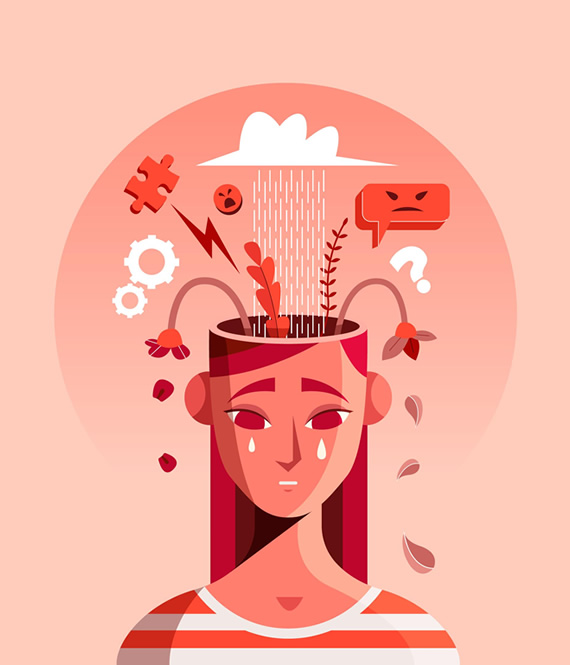
How To Deal With Grief
We recommend helpful products in our articles. Read our full disclosure here. The content on this website is not intended to be a substitute for professional advice, diagnosis, or treatment.

We have all had to experience feeling grief in our time; some losses will be monumental and others small.
However, our reactions to the death of someone we loved, whether it is a parent, partner, friend, or pet, can last with us for months and even years.
Life’s greatest gift is the bond and love we feel for another.
The high cost of this gift is the devastation that comes when this gift is taken from us.
While death is the most common reason to feel grief, it is also a normal response to divorce and to the loss of a job.
The first step to dealing with grief is to appreciate it as a shared experience.
The next step is to seek any support you might need to guide you through the emotional, physical, and spiritual impacts of the loss.
Here we offer some insights to help.
Bereavement and Grief
Bereavement is the period when you have experienced a loss.
It is usually time-limited and is defined by conventions and expectations.
The difficulty lies in the difference between a period of bereavement and that of grief.
Often, our grief extends long beyond the time that people perceive us as having experienced bereavement.
When we lose something or someone, we do not only respond emotionally.
Our physical well-being is shaken; we struggle to keep up social connections, and our spirituality is challenged.
While bereavement is often thought to be the period of most acute grief, it is not to underestimate the power of response beyond this time.
What Are The Symptoms Of Grief?
A symptom is a strange word for what you feel when you lose someone.
It suggests a disorder when the emotional and physical reactions are a normal part of processing the experience.
The emotional symptoms to be expected include crying constantly or maybe a feeling of complete numbness and disconnect.
You may be more anxious and for a long-time struggle to find any joy in life.
As our emotions directly impact our physical well-being, this trauma will also manifest in problems with the gut, headaches, muscle soreness, and even pain in the chest.
While this physical response is normal, if it feels extreme or lasts for a long time, you may want to seek advice from your GP.
The Five Stages Of Grief
No one experiences grief exactly as the person next to them.
There is, however, a model of grief that is widely recognized.
This five-stage process represents a journey that most of us will recognize even if we did not follow it completely.
First, we may struggle with denial.
We will not want to believe the news we have been given.
We may continue to wait for the person we have lost to appear.
Second, we may suffer from extremes of anger.
It could be this is directed at the lost loved one, yourself, or another.
There will be the need to blame someone.
Next, there is a period of bargaining.
Here you look to make deals in the hope you can wish your loved one back to life or exchange yourself for them.
The fourth stage will likely last the longest.
The period of depression could hold you in its power for months or years.
It is that sense that you can never enjoy life in the same way.
Finally, we reach acceptance.
Acceptance does not mean we forget but that time has passed, and we can begin to see a life without the person we have lost.
The sense that at some point time will allow us to move on and the pain will decrease is essential to your belief in your recovery from grief.
While at the time it feels this upset will never ease, there is much evidence to suggest you will move on.
How To Cope When It Gets Too Much
While we are suggesting showing patience and allowing the process of grief to pass through, you may feel it has gone on too long.
You should make this determination.
No one ever feels better when asked by an outside party to “get over it”.
As someone who is grieving, you need to decide if the level of grief you are experiencing is prolonged or complicated.
You may want to start by talking to friends and relatives.
Often, sharing stories about the loved one can help.
If this doesn’t seem to be working, you can ask for help from your GP.
The doctor may offer you medication or suggest grief counseling.
You should consider this option if you are considering suicide or self-harm.
There are other organizations, such as Mind and The Grief Trust who can organize one-to-one chats or support groups.
Finally, it is important to hear that grief takes time to pass and everyone feels it in one way or another.
You are neither alone nor acting abnormally.
You first need to allow yourself to feel the grief to allow it to pass through.
"We love to research problems, examine studies, analyze solutions, and share with you ideas that make life healthier. You can learn about us and our editorial standards here. Have suggestions or feedback to share? Send us a message!."













Leave a Comment